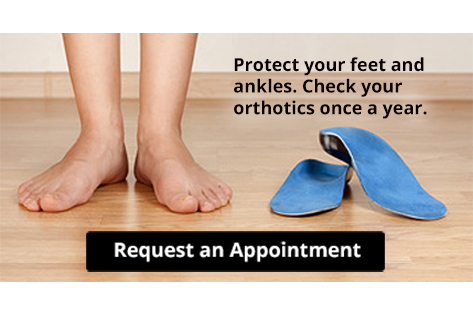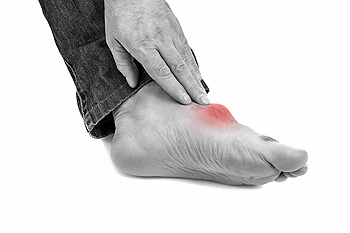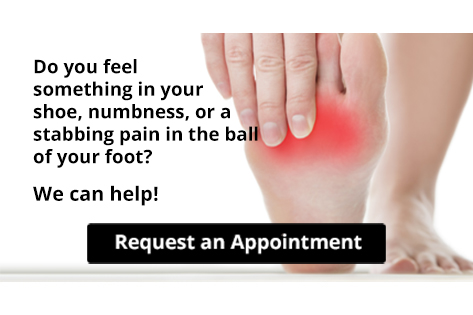 Since the feet are used constantly throughout one’s lifetime, taking care of your child’s feet is essential in maintaining their overall health. First, it is important to allow the feet to have free movement in their infant stages. Unless your child is cold or going outside, the feet should not be restricted by tight foot coverings such as socks, shoes, bootees, or leggings. It is also important to make sure that your baby’s socks and shoes fit properly since their feet are always growing, and coverings that are too tight may impact circulation. Lastly, make sure to wash your child’s feet daily with soap and water. Once your child is ready to start walking, let them learn at their own pace. If your child’s toes turn out frequently, or one foot turns in, or they aren’t walking by 18 months, it is recommended that you seek the care of a podiatrist for further help.
Since the feet are used constantly throughout one’s lifetime, taking care of your child’s feet is essential in maintaining their overall health. First, it is important to allow the feet to have free movement in their infant stages. Unless your child is cold or going outside, the feet should not be restricted by tight foot coverings such as socks, shoes, bootees, or leggings. It is also important to make sure that your baby’s socks and shoes fit properly since their feet are always growing, and coverings that are too tight may impact circulation. Lastly, make sure to wash your child’s feet daily with soap and water. Once your child is ready to start walking, let them learn at their own pace. If your child’s toes turn out frequently, or one foot turns in, or they aren’t walking by 18 months, it is recommended that you seek the care of a podiatrist for further help.
The health of a child’s feet is vital to their overall well-being. If you have any questions regarding foot health, contact Dr. Alexander Terris of Total Foot Care. Our doctor can provide the care you need to keep you pain-free and on your feet.
Tips for Keeping Children's Feet Healthy
If you have any questions, please feel free to contact our office located in Wilmington, DE . We offer the newest diagnostic and treatment technologies for all your foot care needs.
 Pregnant women often experience foot pain, and a common ailment during pregnancy can include leg cramps. They may develop as a result of shortened calf muscles, and they can cause severe pain and discomfort. Additional reasons why foot cramps can develop may be from a vitamin deficiency, or an imbalance in electrolytes. This type of pain generally occurs in the third trimester, and will gradually diminish once the baby is born. Relief may be attained when the affected leg is stretched, and the foot is rotated several times in clockwise and counterclockwise directions. If you would like additional information on why leg cramps can occur during pregnancy, and how to prevent them, please consult with a podiatrist.
Pregnant women often experience foot pain, and a common ailment during pregnancy can include leg cramps. They may develop as a result of shortened calf muscles, and they can cause severe pain and discomfort. Additional reasons why foot cramps can develop may be from a vitamin deficiency, or an imbalance in electrolytes. This type of pain generally occurs in the third trimester, and will gradually diminish once the baby is born. Relief may be attained when the affected leg is stretched, and the foot is rotated several times in clockwise and counterclockwise directions. If you would like additional information on why leg cramps can occur during pregnancy, and how to prevent them, please consult with a podiatrist.
Pregnant women with swollen feet can be treated with a variety of different methods that are readily available. For more information about other cures for swollen feet during pregnancy, consult with Dr. Alexander Terris from Total Foot Care. Our doctor will attend to all of your foot and ankle needs.
What Foot Problems Can Arise During Pregnancy?
One problem that can occur is overpronation, which occurs when the arch of the foot flattens and tends to roll inward. This can cause pain and discomfort in your heels while you’re walking or even just standing up, trying to support your baby.
Another problem is edema, or swelling in the extremities. This often affects the feet during pregnancy but tends to occur in the later stages.
How Can I Keep My Feet Healthy During Pregnancy?
If you have any questions please feel free to contact our office located in Wilmington, DE . We offer the newest diagnostic and treatment technologies for all your foot and ankle needs.
Read more about Pregnancy and Foot Health
Custom orthotics, or shoe inserts, should be periodically replaced. Orthotics must fit properly to give you the best results. Protect your feet and ankles!
 Football players run a high risk for developing a variety of injuries, and some of those injuries involve the foot or ankle. One common injury is an Achilles tendon rupture. The Achilles tendon is the longest and strongest tendon in the body, and it helps players push off their feet, jump, and accelerate. Overuse or excessive force can result in a tear or rupture. Treatment generally requires surgery and about 9 months to heal, but with new technology some players have returned to play just 6 months after surgery. High ankle sprains occur often, and they are the result of a tear to the ligaments that connect the tibia and fibula. Recovery can take as long as 6 to 8 weeks. A complex career-threatening injury is known as a Lisfranc injury. This occurs when there is a sprain or break of the metatarsal bones in the mid foot. Even a minor sprain in the mid foot that doesn't require surgery can still take 6-8 weeks to heal. Lastly, when a player hyperextends their big toe, it is known as turf toe. This is caused by the ligaments under the joint of the big toe being ruptured or sprained. It is highly suggested that anyone who is suffering with a foot or ankle injury seek the care of a podiatrist.
Football players run a high risk for developing a variety of injuries, and some of those injuries involve the foot or ankle. One common injury is an Achilles tendon rupture. The Achilles tendon is the longest and strongest tendon in the body, and it helps players push off their feet, jump, and accelerate. Overuse or excessive force can result in a tear or rupture. Treatment generally requires surgery and about 9 months to heal, but with new technology some players have returned to play just 6 months after surgery. High ankle sprains occur often, and they are the result of a tear to the ligaments that connect the tibia and fibula. Recovery can take as long as 6 to 8 weeks. A complex career-threatening injury is known as a Lisfranc injury. This occurs when there is a sprain or break of the metatarsal bones in the mid foot. Even a minor sprain in the mid foot that doesn't require surgery can still take 6-8 weeks to heal. Lastly, when a player hyperextends their big toe, it is known as turf toe. This is caused by the ligaments under the joint of the big toe being ruptured or sprained. It is highly suggested that anyone who is suffering with a foot or ankle injury seek the care of a podiatrist.
Sports related foot and ankle injuries require proper treatment before players can go back to their regular routines. For more information, contact Dr. Alexander Terris of Total Foot Care. Our doctor can provide the care you need to keep you pain-free and on your feet.
Sports Related Foot and Ankle Injuries
Foot and ankle injuries are a common occurrence when it comes to athletes of any sport. While many athletes dismiss the initial aches and pains, the truth is that ignoring potential foot and ankle injuries can lead to serious problems. As athletes continue to place pressure and strain the area further, a mild injury can turn into something as serious as a rupture and may lead to a permanent disability. There are many factors that contribute to sports related foot and ankle injuries, which include failure to warm up properly, not providing support or wearing bad footwear. Common injuries and conditions athletes face, including:
Sports related injuries are commonly treated using the RICE method. This includes rest, applying ice to the injured area, compression and elevating the ankle. More serious sprains and injuries may require surgery, which could include arthroscopic and reconstructive surgery. Rehabilitation and therapy may also be required in order to get any recovering athlete to become fully functional again. Any unusual aches and pains an athlete sustains must be evaluated by a licensed, reputable medical professional.
If you have any questions please feel free to contact our office located in Wilmington, DE . We offer the newest diagnostic and treatment technologies for all your foot and ankle needs.
Read more about Sports Related Foot And Ankle Injuries Patients who experience gout attacks are aware of the severe and debilitating pain this condition may cause. It is considered to be a form of arthritis and typically affects the joints in the big toe. Some of the symptoms that are generally associated with gout include swelling on or near the affected joints, and it may often feel warm when touched. Gout is caused by an excess of uric acid in the bloodstream, which is referred to as hyperuricemia. It may occur from genetic reasons, or from eating foods that have high levels of purines. These can consist of red meat, shellfish, and drinks that have an elevated sugar content. Additionally, existing medical conditions such as diabetes, high blood pressure, and poor kidney function, may play significant roles in developing gout. If you are afflicted with this type of arthritis, it is strongly suggested that you are under the care of a podiatrist who can effectively treat this condition.
Patients who experience gout attacks are aware of the severe and debilitating pain this condition may cause. It is considered to be a form of arthritis and typically affects the joints in the big toe. Some of the symptoms that are generally associated with gout include swelling on or near the affected joints, and it may often feel warm when touched. Gout is caused by an excess of uric acid in the bloodstream, which is referred to as hyperuricemia. It may occur from genetic reasons, or from eating foods that have high levels of purines. These can consist of red meat, shellfish, and drinks that have an elevated sugar content. Additionally, existing medical conditions such as diabetes, high blood pressure, and poor kidney function, may play significant roles in developing gout. If you are afflicted with this type of arthritis, it is strongly suggested that you are under the care of a podiatrist who can effectively treat this condition.
Gout is a painful condition that can be treated. If you are seeking treatment, contact Dr. Alexander Terris from Total Foot Care. Our doctor will treat your foot and ankle needs.
What Is Gout?
Gout is a form of arthritis that is characterized by sudden, severe attacks of pain, redness, and tenderness in the joints. The condition usually affects the joint at the base of the big toe. A gout attack can occur at any random time, such as the middle of the night while you are asleep.
Symptoms
Risk Factors
Prior to visiting your podiatrist to receive treatment for gout, there are a few things you should do beforehand. If you have gout you should write down your symptoms--including when they started and how often you experience them, important medical information you may have, and any questions you may have. Writing down these three things will help your podiatrist in assessing your specific situation so that he or she may provide the best route of treatment for you.
If you have any questions, please feel free to contact our office located in Wilmington, DE . We offer the newest diagnostic and treatment technologies for all your foot care needs.
Read more about Gout
Suffering from this type of pain? You may have the foot condition known as Morton's neuroma. Morton's neuroma may develop as a result of ill-fitting footwear and existing foot deformities. We can help.